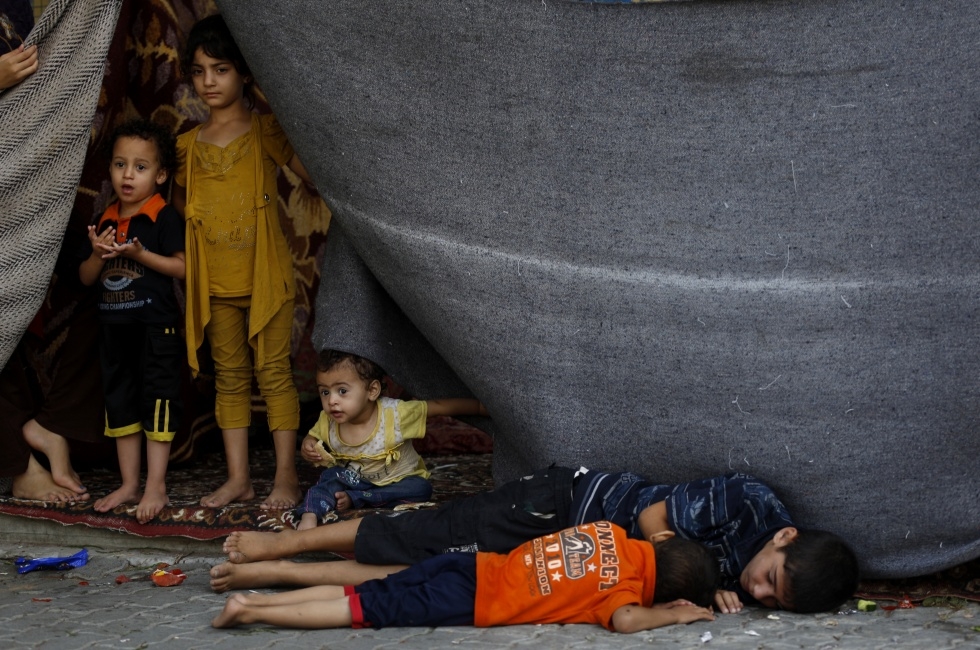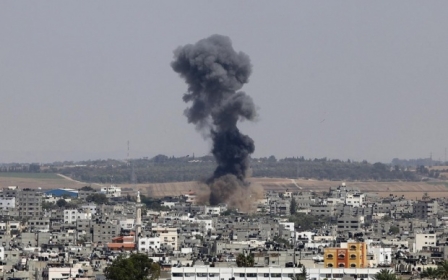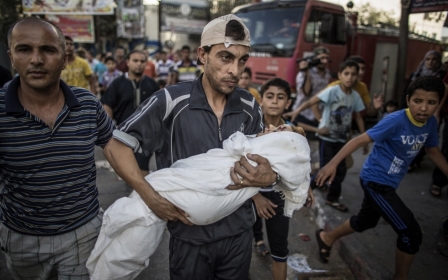The child of today becomes the fighter of tomorrow

One child is being killed every hour in Gaza for the past two days. Shocking statistic, but they deserve it. They are guilty of being in their homes, shelters, ambulances, health centers or playing on the beach just as a shell is about to drop on their heads. Guilty because these precision weapons are guided, too, by a moral purpose.
These Gazan children are forgetting that the finger on the trigger belongs to the most restrained and conscience-stricken army in the world, one that weeps as it shoots. They forget that these bombs are not meant to destroy, but to rebuild. Gaza in fact has been rebuilt five times since 2006, as these children have witnessed.
Wars destroy. Operations cleanse. In fact, this forensically-executed, pin-point operation should really be regarded as nothing more sinister than a giant bottle of bleach. When applied judiciously, it disinfects 1.8 million Palestinians of all unhealthy bacteria, like Hamas, Islamic Jihad or the will to resist. Just as well, because 1.6 million of them suffer from food insecurity anyway.
Once this procedure has been performed - and, yes, it hurts the doctor as much as the patient - the poor, but grateful, people of Gaza will live happily side by side with the rich people of Israel, just as long as they keep on reading those leaflets, sit in complete darkness, drink filthy water and don't go picking thistles anywhere near a watchtower.
Welcome to a parallel universe where the victim is the aggressor, where Hamas attacked Israel because it thought it had nothing to lose, where Hamas is in fact laying siege to Israel. Its been only three weeks, but this space is already well populated by the political establishments of US, Europe and Australia who intone that this attack should be seen in the proper context: as an act of defense.
Movement in this universe is choreographed and we all know the steps. Israel's response has to be "proportionate" but as the EU knows before the word leaves its lips, no international court will be allowed to rule on this issue. Hell will freeze over before an US administration exposes an Israeli government to prosecution in an international court. So the Israeli army can do what it wants. It is currently laying siege to villages in northern Gaza
Logic is alien to this universe. The missile barrage from Gaza makes life in Israel intolerable, as if the barrage in the other direction is tolerable, but when international airlines take the threat of missiles seriously by canceling flights to Ben Gurion Airport, it becomes a gross act of betrayal. Israel does not like being cut off, even for 24 hours. Perhaps it now knows what living in Gaza feels like for the last seven years.
Missing, too, is a basic grasp of human psychology. Coventry got its armaments factories working within weeks of the Luftwaffe's blitz. Survivors did not care about shifts, their own safety or indeed the need to wear helmets."First reaction was shock. The second reaction was 'we're not going to let those buggers get away with it." said Jean Taylor. A similar determination sweeps Gaza in the aftermath of each war, and as a result, the tunnels get deeper, the missiles stronger and longer. Since Gaza's homemade rockets fell on Southern Israel, their range has gone from a few kilometers to over 100. The collective determination gets greater.
And if anyone thinks that these children will be any closer to "recognizing Israel's right to exist" after their extended families have been wiped out, they must be on something powerful. When they grow up, these children will not be asking themselves how quiet they can be as neighbors.
They will be challenging themselves to fight more effectively than their fathers did. Their rage will need channelling. If Hamas is wiped off the map, as Israel's liberals so fervently wish, that task will fall to even more implacable foes. If Israel thinks it can not negotiate with Hamas, what would it say to having the Islamic State, a self-styled caliphate which does not recognize borders, as its neighbor?
Commentators who favor a two state solution, are queuing up to justify the ground operation. British born former editor of Haaretz David Landau argues that a moral case for a ground invasion can be made on the basis that it will do less collateral damage than airstrikes.
In Yedioth Ahronoth the former Shin Bet director Yuval Diskin wrote:
"Should Hamas reject the political initiatives and continue to insist on military confrontation, Israel should appear determined to continue all the way until it occupies the Strip fully and bring down the Hamas regime. There would be no real victors in this scenario. The fighting in this case will leave many dead on both sides. Eventually, the Hamas regime will fall and the state of Israel may need to stay there for a year or two until it is able to cleanse the region from terrorist elements and from the many infrastructures of terrorism that were built there."
Both writers are prepared in other words to exact a high price in Palestinian blood to save a two state solution, because both fear the political results of Palestinian unity. The default mechanism of any "peace process" is in their minds a war process - crush the rejectionists, and then negotiate , or rather impose, a deal on the Palestinians who are left. This is not so far from Netanyahu's approach, although he does not recognise the right of a Palestinian state to exist. His motive in attacking Hamas in the West Bank and Gaza in such a way that a mass volley of rockets became inevitable was primarily a political one. It was to smash the unity government Hamas had just entered into with Fatah, which he soon realised would have broken the siege and thus the entire strategy that Israel has adopted to Gaza for the last seven years.
Exactly the opposite approach was taken in Northern Ireland, another intractable problem which lasted for hundreds of years. This, too, was a conflict in which neither side recognized the other's "right to exist." They still don't.
Republicans do not recognize the partition of Ireland or six counties to this day, although they now work in what they once would have called a "partitionist" assembly in Stormont. Unionists still think of themselves as living in Britain. Mutually exclusive vocabulary still exists, but the war has ended - not entirely, but enough of it to have changed most people's lives.
The war started to end when both sides realized that they could no longer further their ends by fighting. British forces had used literally every counter-insurgency tactic under the sun against the IRA and failed. It was only when Britain addressed the politics of the conflict and British government ministers talked to the IRA face to face, while their campaign was in full flow - long before the Good Friday Agreement and decommissioning started - that progress was made. In the end, it was not the political middle ground of Protestant and Catholic communities in Northern Ireland that cut the deal. It was not the SDLP talking to the OUP, but Sinn Fein talking to the DUP.
The lesson from Northern Ireland, which Diskin has visited, is that this conflict will only come to an end when the net of interlocutors is cast as widely as possible , when as many militant groups are brought around a table as possible in the knowledge that there will always be splits, and that the government of the day sits down and talks to them face to face. The process takes time, huge political will, and inevitably against a backdrop of bombs exploding and bullets flying.
Diskin himself sees the needs for haste in the ground operation:
"Israel must achieve a very significant gain before the onset of complications such as the evolution of other fronts in the West Bank and the staging of protest rallies by Israel's Arab citizens or even the eruption of the northern front. No less serious than all of this would be the rapid erosion of the international mandate the state of Israel enjoys at the moment."
Maybe those "complications" have already started to materialize. Bassam Abu Sharif, former senior advisor to the late Yasser Arafat and one of the main initiators of the Oslo peace process says he was wrong to think Israel's wanted peace. He wrote in the Middle East Eye:
"In June 1988 I wrote an op-ed for the New York Times and the Wall Street Journal in which I suggested the two state solution. I was wrong back then. The Israeli's do not want peace; they want our homes, farms, and lands. We the Palestinian people are to be excised, absorbed, or disappeared without trace.
I imagine similar conclusions are being drawn in Gaza. Today's battered Palestinian child is tomorrow's fighter. Who is training them? The Israeli army is. Who persuades them that their great grandfathers's, their grandfather's and their father's fight is theirs? Israelis do. As the IRA used to say, it takes a good kicking by a British squaddie to make you a Republican. That's what Israel is giving Gazans right now. Man, woman and child. A good kicking.
- David Hearst is editor-in-chief of Middle East Eye. He was chief foreign leader writer of The Guardian, former Associate Foreign Editor, European Editor, Moscow Bureau Chief, European Correspondent, and Ireland Correspondent. He joined The Guardian, from The Scotsman, where he was education correspondent.
The views expressed in this article belong to the author and do not necessarily reflect the editorial policy of Middle East Eye.
Photo credit: Displaced Palestinian children sleep on the ground on July 23, 2014 at a UN school in the northern Gaza Strip refugee camp of Jabalia where displaced families have taken refuge after fleeing heavy fighting in the besieged Palestinian territory (AFP).
Middle East Eye propose une couverture et une analyse indépendantes et incomparables du Moyen-Orient, de l’Afrique du Nord et d’autres régions du monde. Pour en savoir plus sur la reprise de ce contenu et les frais qui s’appliquent, veuillez remplir ce formulaire [en anglais]. Pour en savoir plus sur MEE, cliquez ici [en anglais].




